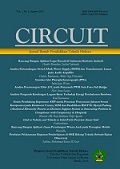EVALUASI MODEL PEMBELAJARAN BERBASIS PROYEK DI KELAS XII SMK N 2 MEULABOH
DOI:
https://doi.org/10.22373/crc.v3i1.4903Keywords:
Project-Based Learning, SMKAbstract
Education is an important base in a nation. Thus, education is an important issue in the development plan. Education plays a very important role in developing the process of transforming Aceh into a superior Province in the next decade. Since 1956, Vocational High Schools began operating in Aceh to become a human resources printing institution that is ready to work in the world of government or industry. Therefore, Project-Based Learning (PBL) was introduced as a reliable method to be implemented in vocational schools. PBL appears as a method that focuses on student-centered learning. This research is a quantitative research that aims to find out students' perceptions of Project Based Learning in SMK N 2 Meulaboh. The sample in this study were students of class XII majoring in TIPTL, TGB, TAB, TAV, TKK, TKR and TSM, totaling 91 people. The results show that in general students believe that Project Based Learning has been running smoothly starting from the initial stage, implementation and final stage. In the initial stage, students state that the teacher starts learning with problems, gives direction and monitors the work of the student project design (min = 4.03). During the PBL implementation phase, students also mentioned that they were able to work in groups, discuss, find tools and submit projects on time (min = 3.98). Finally, at the final stage of PBL, students are confident and believe that the products produced from PBL are useful even though they are not ready to show or sell the product (min = 3.88).
Downloads
Published
Issue
Section
License
Authors who publish in CIRCUIT: Jurnal Ilmiah Pendidikan Teknik Elektro agree to the following terms:
- Authors retain copyright and grant the journal right of first publication with the work licensed under a Creative Commons Attribution-ShareAlike 4.0 International License (CC BY-SA 4.0) that allows others to share and adapt the work with an acknowledgement of the authorship and initial publication in this journal
- Authors are able to enter into separate, additional contractual arrangements for the non-exclusive distribution of the journal's published version of the work (e.g., post it to an institutional repository or publish it in a book), with an acknowledgment of its initial publication in this journal.
- Authors are permitted and encouraged to post their work online (e.g., in institutional repositories or on their website) prior to and during the submission process, as it can lead to productive exchanges, as well as earlier and greater citation of published work. (See The Effect of Open Acces)

